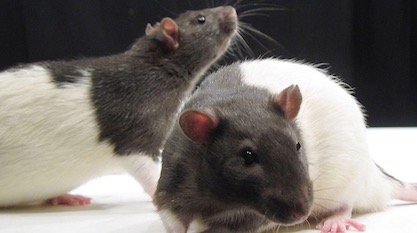 Bioethics
Bioethics
 Medicine
Medicine
Rats Are People, Too!

If animal-rights activists ever had their way, all uses of animals by humans would cease — no matter how beneficial to our welfare and thriving.
That emphatically includes animal research in medical and scientific experiments. Animal rights activists falsely claim that no value to humans comes from such experiments — a claim I have rebutted often. Not only does animal research save human lives and offer invaluable information about biology, but it has also been deemed a crucial human-rights protection. The Nuremberg Code specifically stated that animal studies must be conducted before human subject research. International laws and protocols have encoded this wisdom.
Rats Are “Empathetic”?
But animal rights activists keep fighting. The latest effort — by Kristen Andrews, a professor of philosophy, and Susana Monsó, a bioethicist — argues that it is immoral to use rats in medical research because they are “empathetic.” And that means scientists are horrible people for using them in experiments. From “Rats Are Us,” published by Aeon:
Scientists are willing to continue harming rats because they are seen as a cheap and disposable research tools. In the US, rats are not covered by animal welfare laws: scientists can legally do whatever they want to them. This is true of how rats are acquired, housed, manipulated and killed.
It is true that rats aren’t covered by the Animal Welfare Act. But their proper treatment is an important part of research lab accreditation. Moreover, the animals are very valuable, often having been genetically altered and specially bred to further the accuracy of the experiments. Researchers would be foolish to waste such valuable animals in gratuitous cruelty.
Anecdotal Evidence
As with any human endeavor, anecdotal cases of abuse and wrong behavior by researchers can be shown — as the authors do — but intentional abuse is not systematic (unless you believe research is, by definition, abuse). Indeed, it is slanderous to label animal researchers as ghouls and sadists. These important people are engaging in the beneficent work of searching for medical cures to terrible diseases. The reduced human (and animal) suffering achieved through animal testing cannot be quantified.
But don’t tell that to Andrews and Monsó. They want a “Jane Goodall” to come forward as “an ambassador for rats” to convince us that it is unethical to use them in experiments:
The justification for the rat research is that rats are similar enough to humans to serve as good models of human health, including mental health, but not similar enough to warrant any legal protection from harm. Some scientists even welcome this lack of care toward rats, who with other rodents are considered to ‘offer a cheap, convenient and ethically less controversial alternative to non-human primates in the study of social cognition’. While the free use of rats in research might be less ethically controversial than the use of primates – given the relative lack of rat ambassadors – it is not more ethically justifiable.
The authors argue that it is “anthropocentrism” to provide primates greater protection in research than we do rats:
The very similarity that is appealed to in justifying the science – that primates are vulnerable to physical and mental pain, that they have emotions and relationships that can be destroyed when they are denied normal maternal care – is what creates the moral cost of creating those harms. These moral costs exist in the case of rats too. It is only our moral short-sightedness and relentless anthropocentrism that have prevented us from taking them into account.
A Couple of Points
“Human exceptionalism” is another term for “anthropocentrism,” which is the entirely rational philosophical understanding that our lives have greater value than those of animals.
But human exceptionalism also means we have duties — including to treat animals humanely. We do use primates — primarily monkeys — in medical experiments, as we should. And yes, we do treat monkeys distinctly from rats, because they have higher capacities — not merely because they look more like us.
Whenever I read advocacy pieces like this, I wonder how the authors suggest we further biological and medical knowledge without animal research. If we don’t use rats and mice before testing on what used to be called higher mammals, most experiments would grind to a halt. The consequences for scientific progress would be incalculable. Of course, the authors do not admit this.
The Bottom Line
We should support the “Three Rs” — “replacement, reduction, and refinement” — that aim to reduce the number of animals used in research and the harm caused to research animals that are required. That is a noble cause.
But at some point in the research trajectory, human cell lines, computer models, and the like are insufficient to adequately understand biological systems, test safety, and evaluate efficacy. Eventually, new medical treatments and approaches have to be initially tested in living organisms. That means either using mostly rodents along with other animals, or human beings. The choice is that stark, and for me, an obvious one. It is misanthropy to suggest otherwise.
Photo credit: Lab rats, by Jason Snyder from Washington, DC, United States / CC BY
Cross-posted at The Corner.


